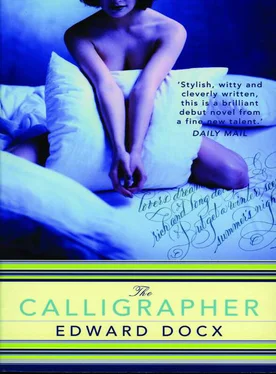1 ...6 7 8 10 11 12 ...21 My studio is not half as spacious as I would like but I have set it up to be as perfect a place to earn a living as possible. It contains everything I need – my reference books, magnifying glasses, knives for cutting and shaping my quills, and the quills themselves: swan for general writing, goose for colour work because it’s softer and, for the finest details, crow feather. The light is not perfect because my window actually faces slightly west of north. But the finest results are always achieved in natural conditions, so, unless I am on a serious deadline, I try to avoid working with the spotlights.
‘You’ve got a very clean place. I like it.’ Cécile was now standing in the doorway to my bedroom, naked except for my toothbrush, which she had now returned to her mouth and was rather lazily employing across her teeth.
‘You think?’
Out came the brush. ‘Tidy and clean for a man, I mean.’ She didn’t seem to be using very much toothpaste. Either that or she had swallowed it.
‘Thanks. Do you inspect a lot of men’s flats?’
‘Yes.’ A quick brush. ‘I have many brothers and they ask me to come over and see if their places are good for’ – she raised her eyebrows – ‘pulling the chicks.’
I brought down two bowls from the cupboard.
She frowned. ‘But my brothers – they never actually get any chicks back. They say: “Cécile, it is a terrible nightmare, there are no chicks in Dijon.”’ She came over and put her chin over my shoulder. ‘You really have strawberries!’
‘Yes.’
‘I was only making fun.’
‘Too late. We’re having them now. I haven’t got anything else. You want cream?’
‘Of course.’
‘OK.’
She stood back and watched me grind the coffee beans.
Ordinarily, I would have preferred to bring my trusty Brasilia to life, firing it up in all its shimmering glory and producing some coffee we could all have been proud of. (The true espresso, I submit, is modern Italy’s gift to the world – their great and most eloquent apologia. Meanwhile, here in England we seem to have traded our inheritance for a jamboree of high-street chains, peddling lukewarm coffee-flavoured milk shakes and lactescent silt.) However, not only is an espresso machine a little ostentatious, especially when still (in effect and despite the intervening night) on a first date, but also – crucially – its use results in single cups which, in turn, result in significantly shorter breakfasts-in-bed. So cafetière it had to be.
‘Shall I carry something?’
‘Sure.’
Cécile returned my brush to her teeth and turned on her heel with a bowl in each hand.
I have to say that I love the mornings almost as much as the nights. Best of all, you get to wake up and be the first person that day to see the true untroubled beauty of a woman’s face – brow clear, hair unfussed. (‘She is all states, and all princes, I,/Nothing else is …’) But almost as enjoyable, in different ways, is the awkward choreography of the bathroom sequence, the dressing, the where-are-my-earrings?, the what-do-we-say-now?’, the strangely stilted wait for the minicab, or my offer to come down to the Tube. In a slightly sick way, I also look forward to the mutual hangovers (we’re in this together) and most particularly that evanescent feeling of surprise that you sometimes experience after you’ve both been awake for a few minutes – surprise that despite all the static and interference and fundamental insecurity, which so often sabotages English heterosexual encounters, grown-up strangers still do this stuff on a whim.
Broadly speaking (and with all the usual disclaimers about generalizations duly assumed), there are three sorts of women in the morning: those who don’t want to be seen at any cost (as they dash from duvet to duffel coat); those who don’t care and stride around the place naked, daring you not to look (clothes forsaken where they fell); and those who would like to count themselves among the unabashed but can’t quite bring themselves to abandon cover, their modesty clinging like their childhood. Curiously, which type a given woman will turn out to be has nothing to do with class, age or even looks – and you can never tell beforehand – but, paradoxically, you can usually rely on the exhibitionists not to cause any trouble once they have gone. (I don’t know why this is: something to do with their ‘fuck you – you’ve got my number but I don’t give a shit whether you call’ attitude, I guess, whereas the shy ones … oh brother).
I set down the coffee on my side of the bed, passed Cécile her bowl, offered her a spoonful of demerara sugar and then climbed back in myself.
‘So what is it that you do, Jasper? You never said all the time we were at the dinner. I was listening. You are something bad? Like a tax person. Or you sell cigarettes in Africa?’
‘I am a calligrapher.’
‘Un calligraphe?’
‘Absolument .’
She sat up further, holding her bowl out of the way and pushing pillows awkwardly behind her back with her other hand. Her dark skin made her teeth look even whiter.
‘How is that?’
‘It’s good. I mean I enjoy it.’
‘You make your living?’
‘For now. Yes.’
‘You have some work here?’
‘Yes. I work at home.’
‘Can I see after?’
‘Yes, if you like.’ I twisted around to pour the coffee. ‘In fact, last week I started a new job for somebody – a collection of poems – and I just finished the first verse of the first one yesterday, but I’m not sure about it and –’
‘Which person?’
‘A big-shot American guy from Chicago. I’m not supposed to say his name. He owns loads of newspapers and television channels and I had to sign this confidentiality clause because – apparently – he’s so famous and important that if anybody ever found that he had commissioned some poems then Wall Street would collapse.’ Though facetiously spoken, this was true. My client was Gus Wesley – and although I couldn’t conceive of any way in which my disclosure could matter, I had been religiously following Saul’s advice and had told nobody who the work was for, not Will or Lucy or even Grandmother.
Cécile made a mountain under the bedclothes with her knees and set about her strawberries. ‘Money makes men forget they are full of shit. He sounds like a pain in the arse to me.’
‘To be fair …’ – I felt obscurely moved to defend my client – ‘… to be fair, I think the reason he doesn’t want me to tell anyone is because the poems are a present for his new girlfriend’s birthday. He’s already had two marriages and he gets torn apart every time his private life finds its way on to his rivals’ pages. So he’s keeping this hot new honey all to himself. Nobody knows about her. I guess he wants it to stay that way.’
Cécile shrugged and then scraped her spoon with her teeth. ‘I don’t know anything about it. I am not interested in media typhoons.’
It seemed inelegant to correct her. I ate my strawberries.
‘Actually,’ she turned her head, ‘I meant which person – which poet? Not who the poems are for.’
‘Oh sorry: the poet is John Donne.’
‘Now I have heard of him .’ She let her tongue travel across her front teeth. ‘He wrote a poem about death being too proud, I think. I had to write about it for an exam when I was a student. Not easy. But he’s a love poet, yes?’
‘Sort of.’ She had the French way of saying ‘love’ as though it were indeed a god. ‘He writes about men and women – or he does in the collection that I am doing anyway. A lot. But I think there is a whole bunch of other stuff too. Sermons and Holy Sonnets and so on. He seems like a serious guy. I’m going to find out more about him.’
Читать дальше












